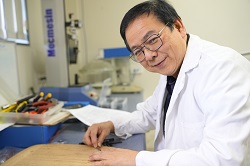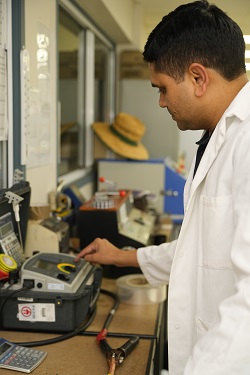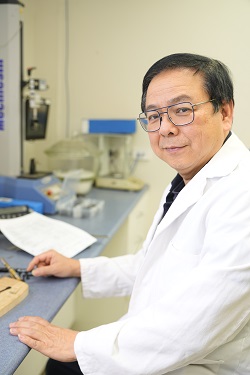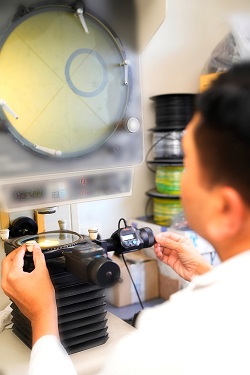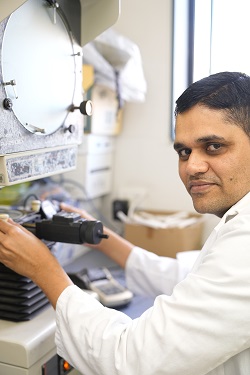Quality Assurance and Testing
Introduction:
At APEC, we are committed to maintain, support, check and improve our quality systems to meet & exceed the industry specifications and quality standards demanded by our clients. Right from the beginning of APEC, a well documented quality management system has been implemented and practiced at each and every stage of its operations. The main focus is on the process control through a dynamic quality assurance system, product development and continuous improvement in the manufacturing line. Quality has been and still remains our top priority at APEC.
Ourselves and our global partners have sophisticated systems that are designed for the purpose of 100% customer satisfaction and highly skilled staff monitor each step of the manufacturing process, ensuring that we are meeting your specifications. Every cable we produce is tested to ensure that it meets both customer and industry specifications.
We are, literally, wired for quality. Our focus on quality does not end on the plant floor. We apply the same principles to every part of our business; our goal being a high-quality experience for the customer at every level of our organization.
APEC has been accredited by ISO 9001:2015 giving assurance of professionalism and expertise in the development and manufacture of the highest quality cables.
APEC is also a member of Australian Cable Makers Association (ACI) supporting their proactive approach to monitor and test cables to ensure that electrical cables available in the Australian market are fully compliant with relevant Australian standards and are safe to use.
APEC products certification process involves:
Electrical Equipment Safety System (EESS). For cable sizes 1mm2 to 16 mm2. The EESS is a regulatory framework aimed at increasing consumer safety when interacting with household electrical equipment. The EESS outlines the safety requirements for registration of Responsible Suppliers and equipment in a centralised national database (National Register).
PCP: Product Compliance Program by GLOBAL MARK (For cable sizes 25mm2 & above): This program ensures reliability, quality assurance, and safety is at the top notch with our products.
When the customers see the accredited symbol from Global Mark, they know that this company has met the rigorous requirements of domestic and international quality and safety standards.
To fulfill the certification requirements, Apec cable samples are checked against relevant Australian standards by Third Party NATA certified labs like TUV Rheinland, CABLAB, etc.
QA Team:
Focused on process and pro-active
Experienced staff function
Takes pride in their work
APEC QA testing:
Accelerated life testing simulates the normal types of wear and tear that happens to a product when in normal use. APEC is able to design a series of tests to determine how resistant the product is to stress, strain, temperatures, pressure, voltage, vibration, and many other factors.
Australia experiences temperatures ranging from -10 to +40°C depending on location and season. Cables installed in roof and wall cavities risk encountering extreme heat for prolonged periods during their service life.
Test Examples:
Final Inspections: QA inspector checks the cable sample configuration in accordance with relevant standards and technical datasheets.
Mechanical Test: Tensile strength, Elongation, etc
Electrical Test: Resistance test, High voltage test,
Ageing test: Accelerated ageing takes place in ovens using prescribed temperature and air flow. The temperature and duration of ageing is dependent on the type of compound and its temperature rating, for example, a PVC V-90 compound will be aged at 115 ± 2°C for 504 hrs (21 days). XLPE will be aged at 135 ± 3°C for 168 hrs (7 days).
The test consists of a comparison of the physical characteristics (tensile and elongation) of the compound based on before- and after-ageing values, effectively reporting loss in mechanical properties.
Loss of Mass: Loss of mass is the evaluation of loss of plasticisers and lubricants due to volatilisation during heating. The temperature and duration of ageing is dependent on the type of compound and its temperature rating, for example, a PVC V-90 compound will be aged at 115 ± 2°C for 120 hours. The test consists of comparison of weight of the compound before and after ageing.
Vertical flame Propagation test: A cable with approx length of 60 cm is mounted vertically using two clamps, pre-defined flame is applied to the bottom end for a period of 60 seconds (120 seconds for cable OD >25 mm). The test is deemed pass if, after the flame is removed, the burning cable extinguishes itself and the fire damage is at least 50 mm from the upper mounting clamp (charring between 50-540 mm).
High voltage test:
3.5KV high voltage is passed through the cable for 5 minutes.
Second one is 5 m cable sample immersed in water for 12 to 16 hours and then 1.8 kv voltage is applied between each core and water as earth.
Hot Set test (for XLPE), Hot Set test is used to determine the thermal stretching and shrinkage under defined test conditions.
Insulation resistance constant test, Indentation test, Carbon test, etc.
Conclusion:
A custom cable assembly that falls short of requirements or fails before expected can be a costly or even dangerous mistake. Ensuring a reliable, high-quality finished product relies on working with a cable assembly manufacturer that has a strong quality control process in place. APEC has the necessary experience and qualifications to produce wires and cables that perform as expected.
© 2023 APEC. All Rights Reserved.
